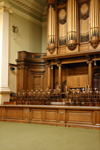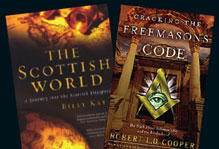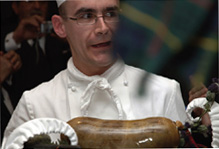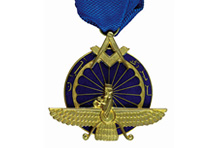Ancestral Research
Grand Lodge regularly receives genealogy enquiries (ancestral research) and is happy to assist in tracing details of relatives who were Scottish Freemasons.
However, beacuse of the way the membership records are kep this is not a straight forward task. The records are held on a Lodge by Lodge basis and are not computerised.
This means that at the very least we need to have a location ideally a specific address for the individual and the time period of spent living at that residence. From this we can examine the membership records of nearby Lodges. This works reasonable well in rural areas where there is usually only one or two Lodges in any given area. However, in large urban areas where there can be dozens of Lodges it is not possible to read through thousands of names in the hope of finding the one in particular.
Ideally therefore the following is required for there to a be realistic chance of finding a given individual in the records:
Date of Birth and Date of Death. This allows us to narrrow the period to be researched. In the absence of these dates an approximate age at death can be helpful.
Places of residence. This allows us to be selective as to the Lodge records places to be searched.
Occupation. This is often helpful when trying to confirm that a particular individual is the one being sought especially when looking for someone with a common name.
When submitting an enquiry please therefore state the person's full name, address(es), DOB & DOD (or age at death) and occupation. Any other information that you have, particularly a Lodge name and number, details from Masonic paperwork (cerificates, membership cards for example) or inscriptions on jewels would be very helpful. In other words please provide as much relevant information as possible!
There is little point in asking: 'Was my Grandfather, Jock Campbell, from Glasgow, a Freemason?" as this is simply insufficient information for a search to be made.
All such enquiries should be sent by email to: This email address is being protected from spambots. You need JavaScript enabled to view it.. Please be aware that at certain times of the year (particularly in the summer months) a very large volume of enquires often means that a reply can take several weeks.
Lodges Records
Freemasons' Hall has some Lodge records which have bee deposited here for safekeeping. As space is limited only those of an important and/or historial nature can now be accepted. Access to this material is restricted and can only be examined by members of staff unless an appointment is made in advance to view these records and that such a request is authorised, in writing, by the Lodge Secretary whose property the Lodge records are, is provided. To enquire in the first instance please email: This email address is being protected from spambots. You need JavaScript enabled to view it. for further information.
Please note that details such as religious faith or political affiliation are Masonically irrelevant and personal details of this nature are not recorded.
Webmaster
You can contact the webmaster for this site by emailing This email address is being protected from spambots. You need JavaScript enabled to view it.
Freemasons' Hall - Organ
Freemasons' Hall Interior
Images of Freemasons' Hall. More will be added over time - should you wish to see a larger, more detailed version, click on the image.
Grand Hall (East)
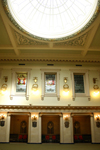
Grand Hall looking east. The present Freemasons' Hall was built during 1911 - 1912. It replaced an earlier building that had been on the site since 1858. The previous building was designed by the famous Scottish architect, David Bryce (who was a Freemason), but by the end of the century the building had become too small for the needs of Grand Lodge and it was decided to build a new larger home - the present building.
The Grand Hall is the main meeting place of Grand Lodge. Regular Communications are held in February, June and October (see the Kalander for exact details). The annual installation takes place on the Thursday before St Andrew's Day when that is not a Thursday.
Grand Hall Looking (South)
Typically known as the 'east' (it is in fact the south!) this is where the Grand Master Mason (presently Brother Charles Iain Robert Wolrige Gordon of Esslemont ) and the Grand Lodge Office-bearers sit during communications of Grand Lodge.
Every Scottish Lodge is entitled to send three representatives to Communications of Grand Lodge and these are normally the Master, Senior and Junior Wardens although some Lodges nominate other Lodge members for this duty. These representatives vote on matters laid before Grand Lodge and the process is therefore very democratic. For more details see pages such as Committees' under 'Structure'. Scottish Lodges overseas are normally represented by Proxy Members appointed for that purpose.
Grand Hall Looking (West)
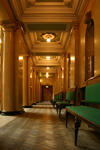
Shown to right is the west side aisle of Grand Hall. The niches hold busts of some of the Past Grand Masters.
Freemasons' Hall is open to the public and tours of the building are provided on week days at 10.00am and 2.00pm. Please note that at certain times tours of the buliding may be unavailable or limited to the Museum only. Please call in advance (0131 225 5577) especially bfore undertaking a long journey.
Freemasons' Hall is open Monday to Friday, 09.00 am - 4.30 pm. Contact details for the Departments within Freemasons' Hall can be found on the 'Departments' page.
Scottish Masonic Homes Charter
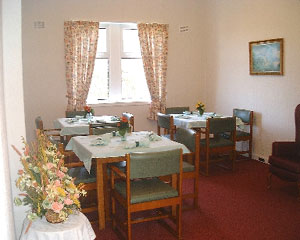
As a person living within one of the Scottish Masonic Homes you have the following rights -
- To live in a home like atmosphere without fear and free from abuse from carers or others living in the Home.
- To be treated with respect, your dignity preserved, with private space only entered by others with explicit permission and with reasonable share of public space for your use.
- To have access to materials and support to enable you to spend your leisure time as you wish, to maintain established pursuits and to be introduced to new activities.
- To move freely in the Home without fear of violence or harassment.
- To engage in sexual activities and relationships which are wanted and understood.
- To have support to make choices about your life.
- To have your money, goods and possessions treated with respect.
- To have the right to express your wishes and priorities and to be personally involved when plans are made for your care.
- To be given appropriate information about keeping yourself safe and exercising your rights, including access to medical paramedical and nursing attention and advice.
- To be accorded the same respect and support as any other person, regardless of age, gender, sexual orientation or ethnic background when making a complaint or seeking help.
- To be provided with an advocate if this is required.
- To be able to carry out your own financial, legal and other personal business at a time that suits you unless there are legal reasons for you not to do so.
- To be able, if possible, to decide who should know about, and have access to, your personal business. To be able to keep and control your money and your personal belongings unless your individual circumstances mean that specific legal arrangements have been made.
- To be free from recrimination if you make a complaint.
Revised April 2002
Statement of Operating Policy, Aims and Objectives
An Overview Of The Scottish Masonic Homes
Sir James McKay House, Edinburgh - registered to provide care for older people in a residential setting.
The Marcus Humphrey House, Bridge Of Weir - consisting of a residential unit registered to provide care for older people and a Day Centre offering care and support to older people with dementia.
Operating Policy, Aims And Objectives
The Scottish Masonic Homes and their related Care Services for older people, which are owned and run by the Grand Lodge of Scotland on a non-profit making basis as part of its charitable work, are registered with the Scottish Commission for the Regulation of Care. The following is a statement concerning the operation of the Homes and their related Services. This is designed to clearly outline the Organisation's philosophy and ethos and to give an insight into the aims and objectives which underpin the operation of all of these Services.
The Grand Lodge of Scotland strives to provide a high standard of care and support for older Freemasons, their wives, widows or dependants and other appropriate applicants who, for various reasons, are seeking residential accommodation, either on a permanent or a temporary basis, in a comfortable and secure environment or who require some support in their daily lives which can be provided via the Day Care and Outreach Services which are attached to the Homes.
The Grand Lodge of Scotland acknowledges and respects the rights of Residents and Service Users as individuals who are actively encouraged and facilitated to retain a level of independence according to their personal circumstances, abilities and wishes. The management of the Homes, the Resource Centre and the Day Centre is geared towards recognising that each person is an individual and, as a result, the aim is that the care provided should be wholly person centred.
The ethos of the Staff in the care of those using our Services, which is prevalent in all of the training given to them by the Organisation, is to be sensitive to the personal needs and wishes of Residents and Service Users, to respect each person's right to privacy, to act positively to preserve dignity and to encourage Residents and Service Users to make choices and decisions for themselves, within their capabilities. Those who reside in the Homes and use the related Services are treated with respect at all times, thus enabling each individual to maintain and/or establish a sense of dignity. The aim is always to provide an appropriate level of support and stimulation in order to maximise the quality and enjoyment of life for each individual. This is facilitated by the use of appropriate assessment tools, regular informal and formal Reviews of care and support and the compilation of Personal Support Plans, all of which Residents and/or their families/advocates/representatives are actively encouraged to participate in.
Residents and Service Users are encouraged to be involved in the running of the Homes and their related Services and to contribute their views and suggestions. This involvement is facilitated by regular meetings with Residents and Service Users and their participation in Reviews and the development of their Personal Support Plans.
For those entering one of the Masonic Homes or using one of the other Services, a Key Worker will be appointed who will be responsible for compiling individual case histories, the dates of any events of special significance, such as Birthdays or Anniversaries, and any particular likes or dislikes which they may have. The aim of this is to assist The Grand Lodge of Scotland in its approach to providing individual and person centred care.
In the allocation of the duties of the Care Staff, Grand Lodge endeavours at all times to make provision for Staff to spend time with Residents in the pursuance of leisure activities and other interests. Residents will be encouraged to continue any existing hobbies and/or develop new interests.
Grand Lodge recognises that the accommodation which is provided within the Homes and related Services must be suitable for the purpose for which it is intended. The furnishings and decoration in each individual area, including bedrooms, communal lounges and dining rooms and group living units, are carefully planned to create an optimum environment for the service which is being provided for the particular client group using each facility.
For the health, safety and benefit of Residents and Service Users, Grand Lodge has developed Policies and Procedures for the guidance of Staff in the operation of its Services. Grand Lodge, as an employer, is committed to the provision of training for its Staff as a means of ensuring that a high quality and meaningful service is provided for Residents and Service Users.
All of our Services are operated in such a way as to enable those who use them to have freedom of choice, where at all possible, with the maximum degree of flexibility within the day-to-day running of the Services. By the appropriate use of the development of meaningful Support Plans, Reviews and Risk Assessments it is aimed to provide the level of support necessary to allow each individual as high a level of independence as possible in their daily lives and for Day Care attendees this is delivered in such a way as not to diminish their individual life skills or be detrimental to their ability to continue to live in their own homes for as long as possible. The same principles apply to the delivery of Outreach Care to Service Users in their own homes.
The recognition of the rights of Residents and Service Users as individuals underpins the way in which Grand Lodge's Services are managed and delivered and is acknowledged within the documentation which supports their operation, for example, this Statement of Operating Policy Aims and Objectives, the Policies and Procedures Manual and the Charter of Rights.
Within the delivery of an appropriate overall person centred care package, Grand Lodge recognises that, in addition to direct care, careful attention must be paid to the ancillary aspects of the operation of its Services, for example, that legislation relating to fire safety, health and safety etc. must be adhered to, that hygiene must be of the highest standard, that appropriate equipment must be provided and maintained accordingly, that buildings and grounds must be maintained to a high standard and that soft furnishings and decoration should be of a high standard.
The ultimate aim of the Grand Lodge of Scotland is that the experience of Residents and Service Users should be enjoyable, positive and meaningful and should enhance their quality of life and that services should be provided in a comfortable, secure and homely environment where Residents and Service Users feel happy and at ease. To this end, all aspects of the Services which Grand Lodge provides are reviewed on an ongoing basis to ensure that the existing standards are maintained and that quality of service is at the highest level possible.
Scottish Masonic Homes Information
The Grand Lodge of Scotland owns and administers two Care Homes, which are registered with the Scottish Commission for the Regulation of Care and offer security and comfort to Freemasons, their dependants and other persons who require care in a Residential setting. The Homes are situated in Edinburgh - Sir James McKay House and Bridge of Weir - The Marcus Humphrey House and can accommodate a total of forty Residents in Single Rooms, many with en suite facilities. The Marcus Humphrey House has a separate Day Care facility catering for older people with dementia. The Day Centre is operated to provide companionship and security for older people who live in their own homes but who require some support in their daily lives. All of the above Services are operated on an open referral basis.
The philosophy of The Grand Lodge of Scotland in operating the Homes is to provide a high standard of care for its Residents who, for various reasons, are seeking residential accommodation in a comfortable and secure environment. In relation to the Day Centre the Service is designed to be as flexible as possible and to provide a stimulating daily routine within a homely environment without reducing Service Users' life skills to the detriment of their ability to continue living independently within the community.
Details of the care and facilities offered in the Scottish Masonic Homes and their related Care Services are clearly defined within the Organisation's Statement of Operating Policy, Aims and Objectives, a copy of which is included in this package. Also included is an Information Sheet giving further details of all of the Services provided.
It is sometimes possible to provide short-term accommodation for a person who may be recovering from illness, or to enable members of the family who normally care for an older relative to take a short holiday. Applications for both short-term and permanent admission should be made through the Secretary of the Lodge with which there is a connection, who will obtain the necessary Forms from Grand Secretary, or where there is no Lodge connection applications should be made directly either to the Manager of the individual Home concerned or to Freemasons' Hall in Edinburgh at the address below.
The cost of all Services is subject to individual circumstances. As a result of the implementation of the National Health Service and Community Care Act on 1st April 1993, all persons requiring financial assistance on entering Residential Care - on either a Permanent, Respite Care or Convalescent basis - are no longer be funded by the Department of Social Security. The responsibility for providing financial assistance, if required, now lies with the Local Authorities and such assistance is not automatic but is subject to the outcome of an assessment of the applicant's needs by the Social Work Department. Should it be decided that the care needs of an individual would best be met by admission to Residential Care and if the qualifying financial criteria are met, namely, not having capital or assets in excess of £19,500.00 funding should be forthcoming. For the purposes of the financial evaluation, to determine eligibility for public-funding, please note that any property owned is treated as capital. All weekly income is taken into account when the amount of assistance to be given on a weekly basis is calculated.
For self-funding applicants, i.e.. those applicants who have capital and assets totalling more than £19,500.00 there may be an entitlement to the Free Personal Care Allowance which was introduced in Scotland on 1st July 2002. To determine eligibility or otherwise, applicants, or their families, will require to make application via the local Social Work Department which will arrange for an assessment to be carried out to ascertain whether or not the Allowance will be payable. This Allowance is currently £145 per week. It should be noted that if an applicant is successful in securing the payment of the Free Personal Care Allowance, they will no longer have an entitlement to Attendance Allowance and if they are receiving this benefit, either they or their family will require to contact the Department of Work and Pensions to arrange for the Attendance Allowance to be stopped.
This information package has been designed for your guidance and further advice and explanation on any matter relating to its contents can be obtained by writing to........
The Grand Lodge of Scotland, Freemasons' Hall, 96 George Street, Edinburgh, EH2 3DH.
Alternatively, you may wish to telephone Grand Secretary's Office on 0131 225 5304 where a member of Staff will be pleased to deal with any enquiries.
Prospective Residents, their families and Social Workers are most welcome to visit the Scottish Masonic Homes, in order to meet the Residents and Staff and to see for themselves the accommodation and facilities available. For the purpose of arranging such visits, or if you would like to speak to the Manager concerning the care provided, the Telephone Number for each Home is as under-noted:-
Sir James McKay House, Edinburgh | 0131 315 2841 |
The Marcus Humphrey House and Day Centre, Bridge of Weir | 01505 613836 |
Scottish Masonic Homes Introduction
Introduction to Information Package and Summary of Details
The Grand Lodge of Scotland owns and administers two Care Homes, which are registered with the Scottish Commission for the Regulation of Care and offer security and comfort to Freemasons, their dependants and other persons who require care in a Residential setting. The Homes are situated in Edinburgh - Sir James McKay House and Bridge of Weir - The Marcus Humphrey House and can accommodate a total of forty Residents in Single Rooms, many with en suite facilities. The Marcus Humphrey House has a separate Day Care facility catering for older people with dementia. The Day Centre is operated to provide companionship and security for older people who live in their own homes but who require some support in their daily lives. All of the above Services are operated on an open referral basis.
The philosophy of The Grand Lodge of Scotland in operating the Homes is to provide a high standard of care for its Residents who, for various reasons, are seeking residential accommodation in a comfortable and secure environment. In relation to the Day Centre the Service is designed to be as flexible as possible and to provide a stimulating daily routine within a homely environment without reducing Service Users' life skills to the detriment of their ability to continue living independently within the community.
Details of the care and facilities offered in the Scottish Masonic Homes and their related Care Services are clearly defined within the Organisation's Statement of Operating Policy, Aims and Objectives, a copy of which is included in this package. Also included is an Information Sheet giving further details of all of the Services provided.
It is sometimes possible to provide short-term accommodation for a person who may be recovering from illness, or to enable members of the family who normally care for an older relative to take a short holiday. Applications for both short-term and permanent admission should be made through the Secretary of the Lodge with which there is a connection, who will obtain the necessary Forms from Grand Secretary, or where there is no Lodge connection applications should be made directly either to the Manager of the individual Home concerned or to Freemasons' Hall in Edinburgh at the address below.
The cost of all Services is subject to individual circumstances. As a result of the implementation of the National Health Service and Community Care Act on 1st April 1993, all persons requiring financial assistance on entering Residential Care - on either a Permanent, Respite Care or Convalescent basis - are no longer be funded by the Department of Social Security. The responsibility for providing financial assistance, if required, now lies with the Local Authorities and such assistance is not automatic but is subject to the outcome of an assessment of the applicant's needs by the Social Work Department. Should it be decided that the care needs of an individual would best be met by admission to Residential Care and if the qualifying financial criteria are met, namely, not having capital or assets in excess of £19,500.00 funding should be forthcoming. For the purposes of the financial evaluation, to determine eligibility for public-funding, please note that any property owned is treated as capital. All weekly income is taken into account when the amount of assistance to be given on a weekly basis is calculated.
For self-funding applicants, i.e. those applicants who have capital and assets totalling more than £19,500.00 there may be an entitlement to the Free Personal Care Allowance which was introduced in Scotland on 1st July 2002. To determine eligibility or otherwise, applicants, or their families, will require to make application via the local Social Work Department which will arrange for an assessment to be carried out to ascertain whether or not the Allowance will be payable. This Allowance is currently £145 per week. It should be noted that if an applicant is successful in securing the payment of the Free Personal Care Allowance, they will no longer have an entitlement to Attendance Allowance and if they are receiving this benefit, either they or their family will require to contact the Department of Work and Pensions to arrange for the Attendance Allowance to be stopped.
This information package has been designed for your guidance and further advice and explanation on any matter relating to its contents can be obtained by writing to
The Grand Lodge of Scotland, Freemasons' Hall, 96 George Street, Edinburgh, EH2 3DH.
Alternatively, you may wish to telephone Grand Secretary's Office on 0131 225 5304 where a member of Staff will be pleased to deal with any enquiries.
Prospective Residents, their families and Social Workers are most welcome to visit the Scottish Masonic Homes, in order to meet the Residents and Staff and to see for themselves the accommodation and facilities available. For the purpose of arranging such visits, or if you would like to speak to the Manager concerning the care provided, the Telephone Number for each Home is as under-noted:-
Sir James McKay House, Edinburgh - 0131 315 2841
The Marcus Humphrey House and Day Centre, Bridge of Weir - 01505 613836
This email address is being protected from spambots. You need JavaScript enabled to view it.
Finance
If you have any queries regarding financial aspects - payment of Lodge dues, Proxy Membership, Suspense Accounts etc you may e-mail the Finance Department via the following email address This email address is being protected from spambots. You need JavaScript enabled to view it.">This email address is being protected from spambots. You need JavaScript enabled to view it..
Administration
All other matters of General Administration, stationery queries, membership registration enquiries, Lodge supplies etc. should be addressed to This email address is being protected from spambots. You need JavaScript enabled to view it.">This email address is being protected from spambots. You need JavaScript enabled to view it..
Museum and Library

Please note that the Museum is closed at particular times of year. For details of dates please click here.
The Museum houses the oldest Masonic Records in the world (those of Lodge Aitcheson's Haven dating from January 1599), the famous 'Burns Inauguration' painting, numerous Masonic Artifacts - including Jewels, Ceramics, Clocks and Watches, and the records of the membership of many Famous Scottish Freemasons both at home and overseas.
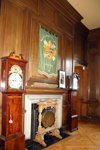
The Museum of the Grand Lodge of Scotland contains some unique Scottish artifacts. The collection might best be described as 'eclectic' but the connecting theme, with few exceptions, is Freemasonry. A Masonic Bowie Knife from Texas (Bowie was a Freemason) to a Masonic Zippo lighter (!) are a few modern items to have been 'made' Masonic. More traditional items as mentioned previously include glasses, clocks and oil paintings. In addition there are numerous items kindly donated by Freemasons or their relatives and it is by this means that the collection primarily continues to grow.
On this page we shall display some choice items reflecting the 'eclectic nature of the collection but also in an attempt to demonstrate the range of items held in the Museum, and a lesser extent, the Library, and in so doing show how Scottish Freemasonry different is different from that practised in other parts of the world. These differences manifest themselves in many ways but here we can only give examples as reflected in physical objects although there are also significant divergences not easily presented visually such as ritual, charity and esoteric interpretations. Scottish Masonic symbolism is one obvious difference from the rest of the Masonic world and we shall begin therefore by presenting some Scottish Masonic jewels.
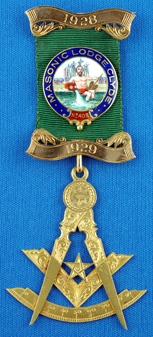 Past Master's Jewel, Lodge Clyde, No.408 (Glasgow)
Past Master's Jewel, Lodge Clyde, No.408 (Glasgow)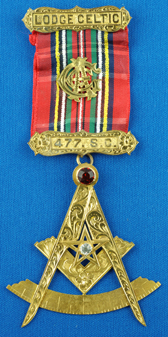 Past Master's Jewel, Lodge Celtic, No.477 (NZ)
Past Master's Jewel, Lodge Celtic, No.477 (NZ)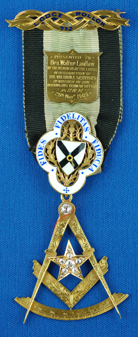 Past Master's Jewel Lodge Pollok, No.772 (Glasgow)
Past Master's Jewel Lodge Pollok, No.772 (Glasgow)
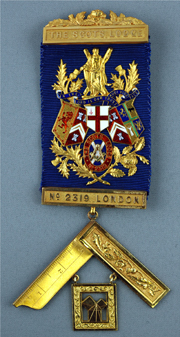
In contrast to A Scottish Past Master's Jewel this is a Past Master's Jewel of an English Lodge (image on the right-hand side) albeit one founded for ex-patriate Scots in London. Note different symbolism used.
There are many different kinds of Masonic jewels, many people would describe them as medals, but Freemasonry has it's own vocabulary, ritual, symbolism - in fact it has an entire 'language' of it's own jewels are one small part of that language. A Past Master's jewel is that which is awarded to someone who has served as Master of a Lodge. The period is typically a year but there are many Lodges in Scotland where two year's service is expected. Past Master's jewels are often the most ornate because they indicate the recognition that Lodge members have for the individual who lead the Lodge for a certain period of time. It can be seen therefore that this kind of jewel can only be worn by a certain kind of Freemason - those who have been Masters of a Lodge. Although the symbolism remains standard (although there are occasional exceptions) Scottish Craft jewels (including Past Master's jewels as above) invariably reflect the colour(s) of the Lodge's regalia - something that we shall discuss in more detail when we come to consider Lodge aprons etc.
Other jewels have different purposes and therefore different symbolism. Examples of these are those worn by Founder Members of a Lodge and can only be worn by such members. Some Lodges have member's jewels which usually compliment the Lodge regalia. Another type of jewel is awarded by some Lodges to Freemasons who, although not members of that particular Lodge, have assisted in such a manner that the Lodge will present them with an Honorary Member's jewel. Lastly, there are Anniversary jewels which members can purchase and wear if they took part in significant a Anniversary of a Lodge. Significant Anniversaries are considered to be: 50, 100, 150 and so on. There is one other type of jewel and these do not relate to Lodges but rather to Grand Lodge, Provincial Grand and District Lodges and Lodges last but not least ones which do not 'fit' any other category. We shall, below, give some examples and explanation of such jewels.
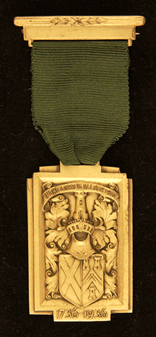 Gold Grand Lodge of Scotland 200th Anniversary Jewel 1936 (obverse)
Gold Grand Lodge of Scotland 200th Anniversary Jewel 1936 (obverse)goldweb.jpg) Gold Grand Lodge of Scotland 200th Anniversary Jewel 1936 (reverse)
Gold Grand Lodge of Scotland 200th Anniversary Jewel 1936 (reverse)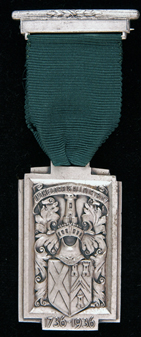 Silver Grand Lodge of Scotland 200th Anniversary Jewel 1936 (obverse)
Silver Grand Lodge of Scotland 200th Anniversary Jewel 1936 (obverse)silverweb.jpg) Silver Grand Lodge of Scotland 200th Anniversary Jewel 1936 (reverse)
Silver Grand Lodge of Scotland 200th Anniversary Jewel 1936 (reverse)

